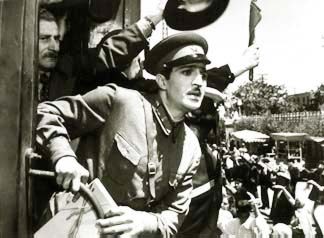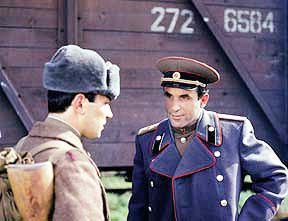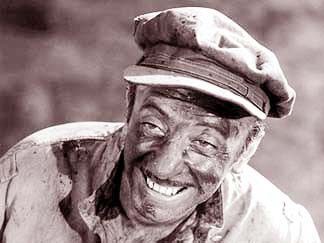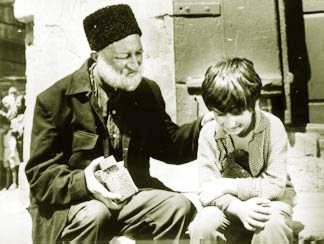|

Autumn 1997 (5.3)
Pages 40-45
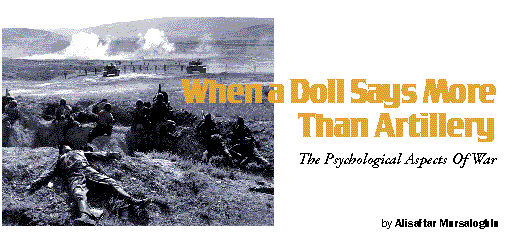
War provides an immensely
riveting and powerful subject for cinema. But making war movies
is exorbitantly expensive. Filming battle scenes may require
hundreds, even thousands of actors and extras. The additional
salaries, uniforms, tanks and artillery all add substantially
to costs of filming. Here's how resourceful filmmakers from Azerbaijan
have dealt with this challenge.
The theme of war has always
captured the imagination of cinematographers. Azerbaijani filmmakers
are no exception. World War II or what Soviets usually refer
to as the "Great Patriotic War" (1941-1945) broke out
rather unexpectantly on June 22, 1941. Although Azerbaijan never
became a combat zone, the republic suffered tremendous losses.
Between 1940-1946, the population declined more than half a million
people from 3.27 million to 2.73 million. In other words, one
out of every six Azerbaijanis became a victim of the war.
Left: From "Her Great Heart" (Onun
Boyuk Urayi), 1958. Directed by Azhdar Ibrahimov. This is a story
about World War II. Gunduz Abbasov plays Rajab.
Right: From "I Loved You More Than Life"
(Sizi Dunyalar Gadar Sevirdim), 1985. Rasim Ismayilov, Director.
The story features general, Hazi Aslanov, played by Ramiz Novruzov.
And, of course, Hitler
had his eye on Baku, obsessed with the idea of capturing the
vast oil supply to sustain his own war effort. In fact, he had
designated September 25, 1942, as the day German troops would
attack Baku and seize the oil fields. Fortunately, the harsh,
icy, inclement weather of the Caucasus mountains which the Germans
had to cross to get to Baku forced them to abandon their plan.
Azerbaijan played an immense
role in the victory of the war, providing much of the oil for
the Soviet war effort. In 1941, the year of the highest oil production,
Azerbaijan produced 25.4 million tons-a record for the entire
history of its oil industry which today has still never been
surpassed. Every able-bodied person was involved in the war-whether
at the front or at home laboring in munitions factories, oil
fields or with agriculture.
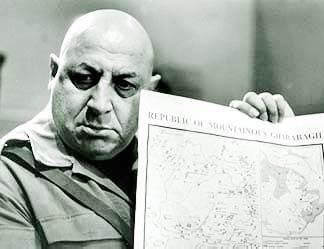  Depiction of the War Depiction of the War
Left: From "Wail" (Faryad), 1993.
Directed by Jeyhun Mirzayev. This is the only film that has been
made about the Nagorno-Karabakh war and the military occupation
by Armenians of 20 percent of Azerbaijan's territory. Malik Dadashov
(above) plays the Armenian officer.
Depicting war has always
interested Azerbaijani and other Soviet filmmakers from two angles.
First of all, they were keen to reflect the process of war directly
by showing actual battle scenes. Secondly, they sought to examine
it from its psychological impact on the population.
Actually, it was very difficult for Azerbaijani filmmakers to
film battlefield scenes. There's hardly a single Azerbaijani
movie which reflects actual events or, for that matter, even
staged battle scenes. Either the projects were too complicated
or, perhaps, the filmmakers simply didn't take enough initiative.
But there were other factors that influenced this decision as
well. First of all, making such films was extremely expensive.
The national film studio "Azerbaijanfilm" was only
allotted funds for four or five films each year. Financial support
for any grand-scale epic project was always difficult to obtain.
But, there was also the issue
of jealousy which must not be underestimated. The theme of war
was monopolized by Russian cinematography. Only the "older
brother" (meaning Russians) could be shown as war heroes.
They were the only ones allowed to be shown defeating the enemy.
The "younger brothers" (meaning, the other republics)
could only take minor parts despite the critical role that Azerbaijanis
and other nationalities played in winning the war. Simply, the
main heroes were written into cinematic history as Russian.
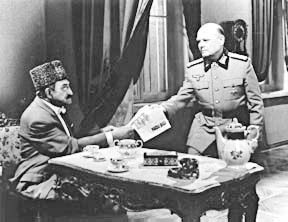  World War II Heroes World War II Heroes
"Azerbaijanfilm" did manage to produce two films about
World War II heroes. The first was entitled "On Distant
Shores" (1958) and directed by Tofig Taghizade.
Left:
From "The Winds Blow
in Baku" (Bakida Kulaklar Asir), 1975. Directed by Mukhtar
Dadashov. The story is about the involvement of Soviet Azerbaijanis
in WW II.
It describes the heroic
deeds of Mehdi Huseinzade who was wounded near Stalingrad and
taken prisoner by the Germans. He later escaped and joined the
partisan effort, using his knowledge of the German language to
disguise himself as a German officer and carry out resistance
efforts. He died during one of these operations. In the movie,
the well-known Nadir Shashigoglu plays Huseinzade and Gara Garayev,
one of Azerbaijan's foremost composers, wrote the music.
Twenty seven years later, Rasim Ismayilov made the movie "I
Loved You with My Whole Heart" (1985) which depicted the
life of the great Azerbaijani General Hazi Aslanov.
But these two films are about
the extent to which movies with battle scenes were produced in
Azerbaijan.
Psychological Consequences
Of course, war is not only the story of generals and soldiers,
or of blood, fire and destruction. War is the story of fear and
powerlessness and the bitterness of grief and sorrow. It is the
intense examination of some of the hardest questions posed by
life itself-those which have no concrete answers or which are
totally unanswerable.
Azerbaijani films often touched on these crucial themes. Sometimes
they succeeded in finding simple objects to express the tragedy
of war even more effectively than if they had had access to a
vast array of artillery stretched over a wide landscape.
The Cherry Tree
"The Cherry Tree," directed by Tofig Ismayilov, is
the story of an old man-Gulam Kishi - and the cherry tree which
grew in his garden. As the story opens, the village children
consider Gulam their best friend. But as the war wears on, Gulam
directs his kindness and affection to his cherry tree, shielding
the tree from the children who are starving. In the process,
Gulam becomes very aggressive and eventually is seen as the enemy
of the children.
The movie shows how war can
destroy even the most tender and gentle feelings, as well as
the most basic moral values of being human.
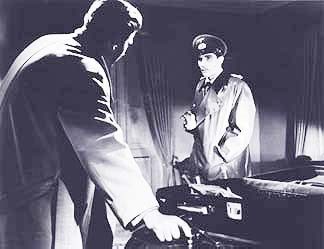  Our Jabish Muallim Our Jabish Muallim
Left: From "On Distant Shores" (Uzag
Sahillarda), 1958. Directed by Tofig Taghizade. Left, L. Borduyukov
plays Karranti and Nodar Shashigoglu plays Mehti.
Another interesting
movie about the war was "Our Jabish Muallim" (1970)
directed by Hasan Seyidbeyli. This film shows the war from the
perspective of the generations of people who were physically
unable to go to battle.
Jabish is a teacher. His eyesight
is weak and prevents him from going to war. Nevertheless, he
tries his best to assist the war effort. One day, he discovers
how to make soap-a much needed commodity both at the front and
at home.
A charlatan named Abulfaz finds out and speaks to Jabish's wife,
scheming ways to buy the soap and sell it on the black market.
Jabish's family desperately needs cash, so his wife agrees to
the plan. As the film develops, the viewers are led to believe
the story will turn out in favor of Abulfaz and Jabish's wife.
At the very last moment, however, Jabish succeeds in sending
the soap to the soldiers at the front.
This film tries to reflect how
you can't judge people from their appearances-nor can you always
distinguish who is strong and who is weak. Azerbaijanis have
an expression, "It's impossible to build a Chinese wall
between the two." As a character, Jabish is obviously weak.
He has to struggle to support his family. On the other hand,
his lofty feelings and great patience enable him to remain resolute
and carry out his goals.
Shared Bread
The subject of the deprivation caused by the war was examined
by Shamil Mahmudbeyov in the movie, "The Shared Bread"
(1971). This film tells the story of children who weren't even
able to find a morsel of bread to eat during the war. Vagif is
12 years old. His father is at war and his mother, on a business
trip.
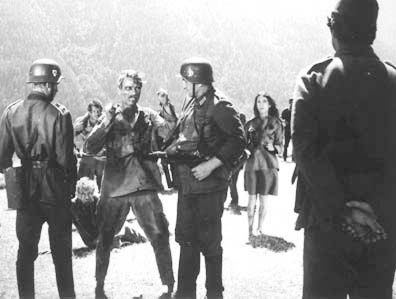  The youth has lost his ration card,
but doesn't want the other boys living in the same courtyard
to feel any obligation to share their bread with him. He is too
proud; begging for something to eat would contradict his nature.
Besides, he realizes it would not be easy to gain the right to
share the bread. Vagif finds a way to work for people and earn
his own bread rather than beg. The youth has lost his ration card,
but doesn't want the other boys living in the same courtyard
to feel any obligation to share their bread with him. He is too
proud; begging for something to eat would contradict his nature.
Besides, he realizes it would not be easy to gain the right to
share the bread. Vagif finds a way to work for people and earn
his own bread rather than beg.
Left:
From "The Winds Blow
in Baku" (Bakida Kulaklar Asir), 1975. Directed by Mukhtar
Dadashov. This is a story about Soviet Azerbaijanis involved
in World War II.
One interesting episode in the film shows a young girl who has
no doll. She experiments with substituting other things to make
her own doll. She tries the water tap, tying her scarf around
it. But the lower part of the tap makes the doll's nose appear
too long. Then, she experiments with her knee, tying the kerchief
around it and drawing eyes and a nose. Her simple creation brings
her great satisfaction. This doll scene may well be one of the
most memorable in all of Azerbaijani cinema.
Sound of the Pipe
In "The Sound of the Pipe" (1975), directed by Rasim
Ojagov, the problem of war is viewed from the perspective of
love. Almost all of the men of the village are at the battlefront.
The women who stayed in the village are working night and day
to support their efforts. Children wake up in the middle of the
night, crying for bread. All of the villagers feel anxious for
the men to return. Mothers are waiting for their sons; wives,
for their husbands and children, for their fathers.
When Sayali's husband dies at
the front, her husband's friend Jabrayil proposes to her. The
people of the village are furious. Jabrayil's brothers leave
home, convinced that their family has been disgraced. One brother
goes crazy; the other falls ill and dies. The only person who
doesn't blame Jabrayil is the "agsaggal" (the wise
old man) of the village-Isfandiyar Kishi. In this film, not a
single sound of weaponry is heard, nor are any battle scenes
depicted, yet we still witness the inherent tragedy of war.
Karabakh War-Innocent
Victims
So far, only one film, "Faryad," (meaning loud cry)
concerns the Karabakh War with Armenians which has been going
on since 1988. A brusque, heavy-set Armenian officer sees a 5-year-old
child playing with a toy gun and gathers the child in his arms,
points to an Azerbaijani hostage and says, "Do you see him?
He is your enemy. You must kill him. Otherwise, he will kill
you."
Both scenes from "Shared
Bread" (Sharikli Chorak), 1970. Directed by Shamil Mammudbeyov.
Story is about a young boy and the difficulties he and other
children have coping with WW II. Left:
The asphalt maker, Mohammad (Fazil Salayev) is sure that they
will win the war. Right:
Dad Ismayil is played by
Aghahusein Javadov and the young boy Vagif is played by Kamran
Rajabli.
In contrast to this scene, another
character, Ismayil, an Azerbaijani, is being held captive by
an Armenian officer. The soldiers torture Ismayil, beating and
kicking him. Despite the physical pain, he doesn't consider it
as brutal as the time when he saw an Azerbaijani girl being raped
and brutally murdered. In another scene, he is pained by overhearing
Armenians in another room celebrating the capture of the Azerbaijani
towns of Khojali and Shusha which were major towns inside the
region of Nagorno-Karabakh where all Azerbaijanis were forced
to flee or be killed by approaching Armenian troops.
Meanwhile, Ismayil tries to
revenge his situation. He slips off the bed, crawls towards a
box of matches and gathering all the loose papers he can find,
manages to start a fire. Upon succeeding, he breathes a sigh
of relief, pleased with his small victory. Suddenly, he hears
a child crying upstairs. He realizes that it's an Armenian baby.
Tears gather in his eyes when he realizes he has endangered the
life of an innocent child.
This scene from "Faryad"
brings to mind what Anar, a famous Azerbaijani writer once said:
"If a soldier doesn't have a feeling of hatred, he won't
be able to fight. But a soldier should confine his hatred to
the soldiers of the enemy and not to the entire nation."
Alisaftar Mursaloghlu, a
screenwriter and journalist, lives in Baku.
From
Azerbaijan
International
(5.3) Autumn 1997.
© Azerbaijan International 1997. All rights reserved.
Back to Index
AI 5.3 (Autumn 1997)
AI Home | Magazine
Choice
| Topics
| Store
| Contact
us
|


